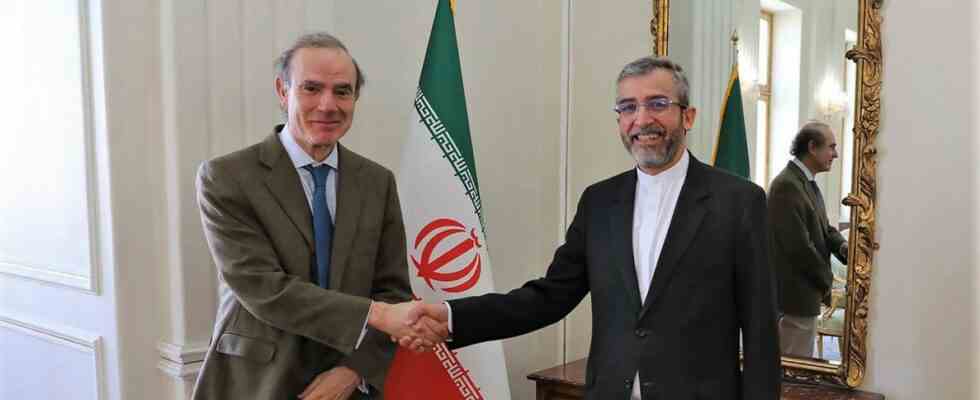The nuclear talks between the EU and Iran on the one hand and the US on the other ended on Monday. This was announced by a high-ranking representative of the EU in Vienna. There is now a text for an agreement to return to the 2015 nuclear deal. It will be forwarded to the contracting parties and the USA by EU foreign policy chief Josep Borrell. They would now have to decide whether they wanted to accept the text.
The decisive factor is likely to be whether the regime in Tehran agrees, although what matters is not just the government of President Ebrahim Raisi, but above all the attitude of Supreme Leader Ayatollah Ali Khamenei. The EU said there was nothing left to negotiate. In her view, it is a “very good compromise for everyone involved”. The EU diplomat went on to say that he expected an answer after the almost two-year negotiations “in a few weeks, very, very few weeks.”
The four-day negotiations were about making final detailed changes to the text that Borrell had previously presented in a final push to break the deadlock in the negotiations. Most of the text had already been completed in March. However, Iran and the USA had not been able to agree on questions such as the scope of the sanctions lifting.
One of the points of contention was the US sanctions against the Revolutionary Guards
Iran’s chief negotiator, Ali Bagheri-Kani, refused to speak directly to US special envoy Robert Malley until the end, leaving EU diplomat Enrique Mora to mediate between the two sides. Since the meeting was not an official round of negotiations, the Europeans only sent technical experts from the foreign ministries to Vienna, not the political directors. This was preceded by a similar round at the end of June in Qatar’s capital Doha, which had remained without results.
One of the points of contention between the US and Iran was the sanctions against the Revolutionary Guards. Tehran had reportedly recently dropped its demand that they be immediately and completely freed from the US sanctions imposed under President Ronald Trump’s government for supporting terrorism.
Iran refuses to provide information to the International Atomic Energy Agency about traces of uranium found in facilities that are not part of the nuclear program: uranium conversion plant in Isfahan.
(Photo: Vahid Salemi/dpa)
However, Iran demanded that an investigation by the International Atomic Energy Agency be ended. The inspectors have found traces of uranium in three facilities that Iran has never declared as part of its nuclear program. IAEA chief Rafael Mariano Grossi demands plausible explanations as to what activities Iran carried out at the three sites in question. The regime has so far refused to answer the IAEA’s questions in this regard. Iran also demanded guarantees from the United States that it would not withdraw from the agreement like Trump did in 2018. However, this is not an international treaty, so that a binding effect on future governments is not guaranteed.
The dispute over control by the International Nuclear Regulatory Authority remains unresolved
According to information from Süddeutsche Zeitung open technical questions were discussed at the meeting in Vienna. Minor changes have been made to the text. The talks were described as cooperative. The dispute over the IAEA investigation remains unresolved. That is not part of the nuclear agreement, but must be clarified between Iran and the IAEA, it said. It is unclear whether Iran can still agree to the agreement. Bagheri-Kani had made it clear that from Iran’s point of view there was a connection between the two dossiers.
The details of the text are not yet known, but it is said to be around 30 pages long. The EU is acting as negotiator in the talks. It is considered unlikely that the agreement can still be saved if a corresponding decision is not made by mid-August or at the latest by the end of August. For one thing, Iran is making continuous technical advances in its nuclear program. On the other hand, it is unlikely that the administration of US President Joe Biden will schedule a debate in the Senate about the agreement shortly before the important midterm elections in early November – it is unclear whether the Democrats will then still have a majority in the Congress Chamber.

